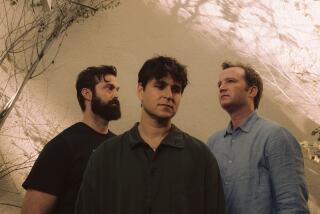Live review: Bloc Party at the Palladium
- Share via
If you want to make any late-millennial urban party-person get all fuzzy and nostalgic, play Bloc Party’s single “Banquet.”
Your subject will likely unwind a tale from a decadent, mid-2000s night out accompanied by the London post-punk quartet’s hit song (though usually these stories will be quite boring tales of dancing in some bar that doesn’t exist anymore). Once the tune’s four-on-the-floor kick drum drops, and the band’s two guitarists slash back and forth to the lyrics “A heart of stone, a smoking gun,” it’s enough to make a craggly, prehistoric 29-year-old feel 22 and dewy again.
We jest, but that’s how Bloc Party resonated back then. Their sound was so prescient in how music would turn out today - danceable, precisely arranged with arty noise, and delivered with equal parts menace and lust. At the band’s headlining Palladium date Friday, their set reminded a lot of fans that Bloc Party was a first taste of those feelings.
The band is touring on “Four,” a comeback album of sorts after a four-year hiatus where singer Kele Okereke had some eventful turns. He released a solo album, “The Boxer,” which dove headfirst into his electronica influences and hidden frontman panache. He also came out as (mostly) gay, and has spoken candidly about how being the band’s lone black and lone non-straight member was a deep, isolating rift.
Whatever the tension had been, their Palladium set proved they worked past it. The group has some extraordinary instrumentalists: drummer Matt Tong performs with the meticulousness of a laptop-producer and the ferocity of a metalhead, while guitarist Russell Lissack wrings beguiling, percussive noises from his echo pedals. These are tough things to play well if a band’s members hate each other – and be sure, they played very well on Friday.
But the break has been kindest to Okereke – coming out obviously lifted something heavy from his heart in performances. On singles like the Chicago-house rave-up “One More Chance” and the jittery, fuzz-blasted “Ares,” he prowled the front ledge of the stage and worked the crowd like a Dean Martin for today’s pan-genre-pan-sexual-pan-everything nightlife culture.
Songs from the band’s early breakthrough albums, 2005’s “Silent Alarm” and 2007’s “A Weekend in the City,” have become a kind of classic rock for hipsters in the autumn of their hipsterdom. The Cure-jangly “This Modern Love” still evoked the fizzy joy of club-hopping with a new crush while ignoring the bar tab damage. “Song For Clay (Disappear Here)” is a cynical, snakebitten ode to partying, but its bridge chant of “East London is a vampire, it sucks the out right out of you” got fist-pumps from fans who never had a hard comedown from a Hackney warehouse debauch.
The only problems came from the band’s new material on “Four.” It’s a very different setting for them, one strangely indebted to churning stoner-metal of Queens of the Stone Age. While the silvery minor-major shifts of “Octopus” and the sheer headbanging mettle of “Kettling” worked as new moods for the group, most of the songs from “Four” felt under-written (“Real Talk”) or over-compensated with guitar slurries (“Coliseum”).
Still, when Okereke quipped from Rihanna’s smash “We Found Love” in their set-closing song “Flux,” he accidentally drew a funny connection. “We Found Love” was produced by the Scottish dance artist Calvin Harris, who back in 2007 was a wiseacre kid calling Bloc Party’s music “rubbish” and “boring” in interviews. But in reacting against Bloc Party, he eventually made a huge hit for Rihanna. Harris may lack the fuzzy nostalgia for them, but that’s still got to count as some kind of influence.
ALSO:
HARD Summer moves on to bigger beats
Pop music review: the two sides of HARD Summer
Review: Calvin Harris performs solo, but should maybe hunt up a woman collaborator
PHOTOS AND MORE
PHOTOS: Iconic rock guitars and their owners
The Envelope: Awards Insider
PHOTOS: Grammy top nominees
More to Read
The biggest entertainment stories
Get our big stories about Hollywood, film, television, music, arts, culture and more right in your inbox as soon as they publish.
You may occasionally receive promotional content from the Los Angeles Times.











